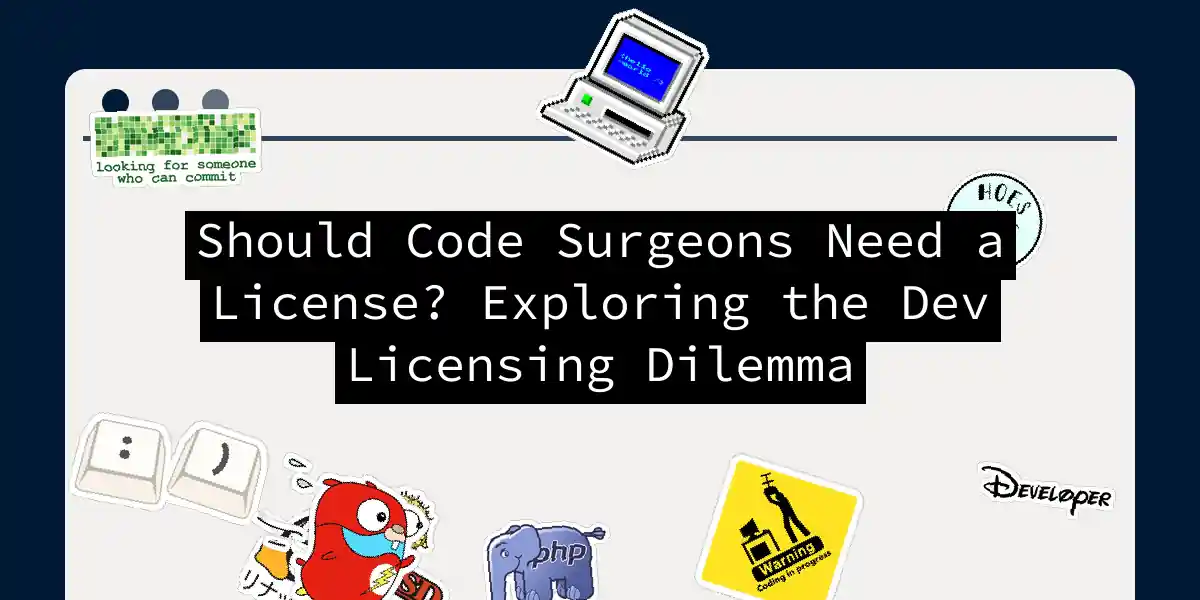Picture this: You’re lying on an operating table when the surgeon leans in and whispers, “Don’t worry, I did a great Codecademy course last weekend.” Suddenly, licensing doesn’t seem like such a bad idea. Now replace “surgeon” with “developer” and “operating table” with “production server.” Still comfortable?
The Great License Debate: From “Hello World” to “Goodbye Career”
The idea of developer licensing isn’t new - Texas has been doing it since the Y2K panic era. But what would it really look day-to-day? Let’s prototype some code:
class DeveloperLicense:
def __init__(self):
self.certifications = []
def renew(self):
if self._pass_annual_exam():
print("License renewed!")
else:
print("Return to coding bootcamp!")
def _pass_annual_exam(self):
return random.choice([True, False]) # Government efficiency simulator
Suddenly that “senior” in your job title feels heavier, doesn’t it? But let’s not get ahead of ourselves - the real juice is in the implementation details.
Current Landscape: Certifications vs Licenses
While traditional engineering licenses require this structured path, our world has more certifications than JavaScript frameworks:
- IEEE’s CSDP ($485 reality check)
- AWS Certified Developer ($150 cloud cash)
- C++ Institute’s CPP (because one semicolon deserves another) I once met a developer with so many certifications, his business card needed a CDN. But do paper credentials prevent disaster?
When Code Kills (Literally)
Consider this tragic MySQL query:
DELETE FROM patients
WHERE diagnosis = 'healthy'
-- Oops, forgot the WHERE clause? More like WHERE's the license?
Now imagine this running in a medical database. Suddenly that $485 certification fee seems cheaper than malpractice lawsuits. The IEEE found over 60% of engineers support licensing, but…
The Innovation Paradox
Licensing could create a two-tiered system:
Would this protect users or create a digital caste system? The 2008 IEEE survey shows support, but Texas’ hardware-focused exam proves implementation challenges.
DIY License Framework (For Your Consideration)
What if we created an open source licensing model?
- Tiered System
$ license-tier --check
Current tier: Junior (0/4 requirements met)
Required:
- 500h mentored coding
- Algorithms exam (85%+)
- Ethics certification
- Open source contributions
- Continuing Education
function maintainLicense() {
const annualRequirement = {
codeReviews: 50,
securityUpdates: 10,
ethicsWorkshop: true
};
return (meetsStandards(annualRequirement))
? 'Keep shipping!'
: 'Mandatory pair programming with Java devs';
}
- Peer Review System
def submit_for_peer_review(code):
if code.contains('//TODO: Fix this'):
return LicenseBoard.reject("Nice try, ChatGPT")
else:
return LicenseBoard.approve_with_conditions(
required_reading="Clean Code Chapter 5")
The Elephant in the IDE
Let’s get real - most code isn’t life-or-death:
// This won't kill anyone... unless the user really
// hates poorly implemented sorting algorithms
fn main() {
let mut arr = vec![3,1,4,1,5,9];
arr.sort_unstable(); // Licensed to sort!
println!("Order restored: {:?}", arr);
}
But as IoT creeps into everything from toasters to tombstones, maybe it’s time for:
void control_nuclear_reactor() {
if (license.valid) {
adjust_control_rods();
} else {
// Hello, this is Microsoft tech support...
}
}
The Verdict: To License or Not to License?
Proponents argue licenses would:
- Raise quality standards (remember the Therac-25 incidents?)
- Increase accountability (no more “worked on” vs “destroyed”)
- Standardize core knowledge (looking at you, FizzBuzz failures) Opponents counter with:
- Innovation suppression (next Zuckerberg might fail algorithms)
- Barrier to entry ($500 exams favor privileged coders)
- Rapid obsolescence (today’s license exam is tomorrow’s COBOL) As for me? I’ll leave you with this thought: We license hair stylists more consistently than cloud architects. Maybe the real question isn’t whether to license, but how to do it without creating a bureaucratic dependency hell.
- Memory leaks
- Security flaws
- "Works on my machine" excuses L-->>D: Returns 42 approval conditions D->>D: Imposter syndrome intensifies
The floor is yours, fellow code wranglers. Should we professionalize programming, or keep it the wild west of logical pistolslingers? The comments section awaits… and yes, anonymous commenting doesn’t require any license. Yet.
